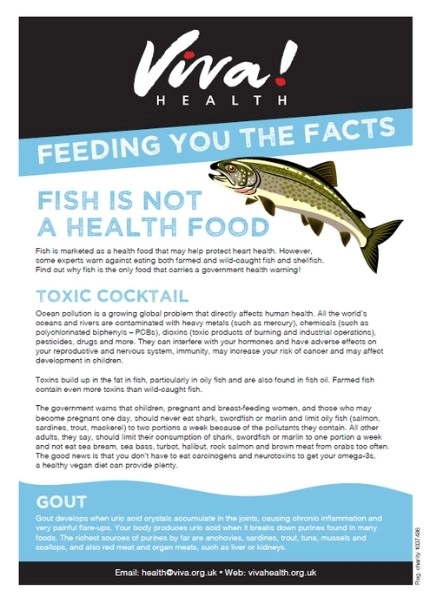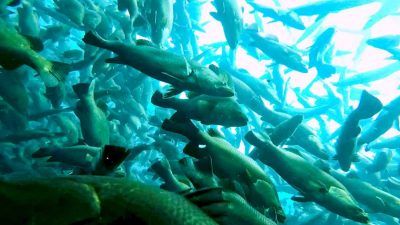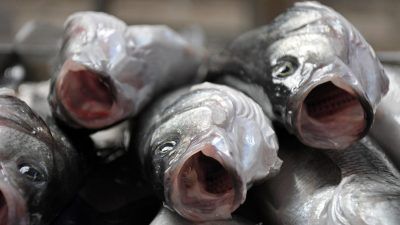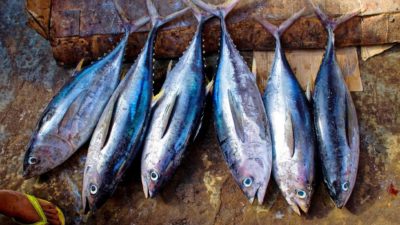Mini factsheet: Fish

Fish is not a health food
Fish is marketed as a health food that may help protect heart health. However, some experts warn against eating both farmed and wild-caught fish and shellfish. Find out why fish is the only food that carries a government health warning!
Toxic cocktail
Ocean pollution is a growing global problem that directly affects human health. All the world’s oceans and rivers are contaminated with heavy metals (such as mercury), chemicals (such as polychlorinated biphenyls – PCBs), dioxins (toxic products of burning and industrial operations), pesticides, drugs and more. They can interfere with your hormones and have adverse effects on your reproductive and nervous system, immunity, may increase your risk of cancer and may affect development in children.
Toxins build up in the fat in fish, particularly in oily fish and are also found in fish oil. Farmed fish contain even more toxins than wild-caught fish. The government warns that children, pregnant and breast-feeding women, and those who may become pregnant one day, should never eat shark, swordfish or marlin and limit oily fish (salmon, sardines, trout, mackerel) to two portions a week because of the pollutants they contain. All other adults, they say, should limit their consumption of shark, swordfish or marlin to one portion a week and not eat sea bream, sea bass, turbot, halibut, rock salmon and brown meat from crabs too often.
The good news is that you don’t have to eat carcinogens and neurotoxins to get your omega-3s, a healthy vegan diet can provide plenty.
Gout
Gout develops when uric acid crystals accumulate in the joints, causing chronic inflammation and very painful flare-ups. Your body produces uric acid when it breaks down purines found in many foods. The richest sources of purines by far are anchovies, sardines, trout, tuna, mussels and scallops, and also red meat and organ meats, such as liver or kidneys.
Fish oil and heart disease
Fish oil, with its omega-3 fats, is often touted as a way to protect against heart disease. However, science shows that these supplements do not reduce the risk of heart disease and should not be marketed as such.
In fact, some studies found that fish oil supplements may increase the risk of atrial fibrillation (irregular heartbeat). Interestingly, plant-based omega-3s (from flaxseed or flaxseed oil, chia seeds, hemp seed, walnuts or rapeseed oil) lower the risk. To ensure your daily intake of omega-3 fats that are essential to good health, you can take one or two tablespoons of these seeds, a teaspoon of their oil, a handful of walnuts or an algal omega-3 supplement (made from microalgae).
Antibiotic resistance and drugs
Fish farms create conditions that put fish under chronic stress and make them more susceptible to infection and disease. At the same time, they are the ideal breeding grounds for infectious bacteria so large amounts of antibiotics are used to prevent and treat infection. This is driving the increase in antibiotic-resistant bacteria. Antibiotic-resistant superbugs pose a major threat to human health because common infections may become untreatable – antibiotics won’t work and the infection may become life-threatening.
Farmed fish and shellfish also receive many other veterinary drugs. A large survey conducted in Europe, USA, Canada and Japan found many violations of the use of the drugs and their residues in fish.
Food poisoning
Fish can carry bacteria, viruses and parasites that may cause a host of nasty illnesses in people. For example, tilapia tends to carry the bacterium Plesiomonas shigelloides which causes diarrhoea,
nausea, vomiting and fever.
The NHS warn that pregnant women, babies and children should avoid eating raw shellfish (such as mussels, clams and oysters) because of the high risk of norovirus food poisoning. It causes vomiting, diarrhoea and fever. Both raw and cooked shellfish can also contain toxins that induce nausea, vomiting, diarrhoea, headaches, numbness, breathing difficulties, memory loss, disorientation and abdominal pain.
Going fish-free can protect your health and contribute to a more sustainable future.
This post has been categorised in: All Print Materials, Mini factsheets







